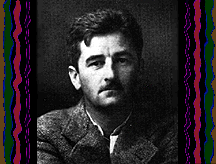 [
Wesleyan Home Page
] [
WesMaps Home Page
] [
WesMaps Archive
]
[
Course Search
] [
Course Search by CID
]
[
Wesleyan Home Page
] [
WesMaps Home Page
] [
WesMaps Archive
]
[
Course Search
] [
Course Search by CID
]
Academic Year 2002/2003
Political Fiction from Plato to the Present
ENGL 227 FA
Thomas More coined the term "Utopia" in a speculative political fiction that describes an actual ideal society - rather than the merely envisioned ideal in Plato's REPUBLIC. More's ironic, trenchant, and at times
elusive
criticism of 16th century England became the standard for an increasingly popular literary form. Meaning "No Place", many subsequent Utopias were devised as the blueprints for future ideal worlds that served to both
criticize
and reform pernicious social norms. We will study the history of this literary form, turning from the early modern Utopias to the "Dystopias," or "Bad Places," which emerged during the disillusionment following the
World
Wars. These nightmarish visions of future social systems, such as Orwell's 1984 or Atwood's HANDMAID'S TALE, subverted the literary conventions of the earlier utopias, and served as warnings about the future of
civilization.
MAJOR READINGS
Plato, THE REPUBLIC
Thomas More, UTOPIA (1516)
William Shakespeare, THE TEMPEST (1611)
Sir Francis Bacon, NEW ATLANTIS (1627)
Andrew Marvell, "The Garden" and other poems
James Harrington, THE COMMONWEALTH
OF OCEANA (1656)
Henry
Neville, THE ISLE OF PINES (1668)
Jonathan Swift, from GULLIVER'S TRAVELS
Samuel Butler, EREWHON (1872)
Ursula LeGuin, THE DISPOSSESSED
Aldous Huxley, BRAVE NEW WORLD
Margaret Atwood, THE HANDMAID'S TALE
EXAMINATIONS AND ASSIGNMENTS
Two short papers and one longer writing project. Some short written assignments. There will be two short ID examinations.
ADDITIONAL REQUIREMENTS and/or COMMENTS
Class attendance and participation is required. Because this is a seminar, each one of us is responsible for contributing to the class. Participation in class means sharing your ideas (by talking) and actively
listening to others. Participation is
worth 10% of your grade.
This class meets the English Department's pre-1800 requirement.
Unless preregistered students attend the first class meeting or communicate directly with the instructor prior to the first class, they will be dropped from the class list. NOTE: Students must still submit a completed
Drop/Add form to the Registrar's
Office.
COURSE FORMAT:
Seminar
REGISTRATION INFORMATION
Level:
UGRD
Credit:
1
Gen Ed Area Dept:
HA ENGL
Grading Mode:
Graded
Prerequisites:
NONE
SECTION 01
- Instructor(s): Fulton,Thomas C.
- Times: .M.W... 02:40PM-04:00PM; Location: DAC300
- Reserved Seats: (Total Limit: 19)
- SR. major: 7 Jr. major: 7
- SR. non-major: 3 Jr. non-major: 1 SO: 1 FR: X
Special Attributes:
- Curricular Renewal: Ethical Reasoning
Links to Web Resources For This Course.
Last Updated on MAR-18-2003
Contact
wesmaps@wesleyan.edu
to submit comments or suggestions. Please include a url, course title, faculty name or other page reference in your email
Copyright Wesleyan University, Middletown, Connecticut, 06459

